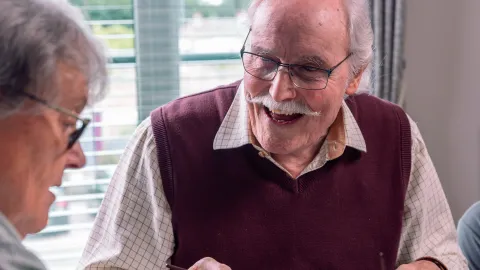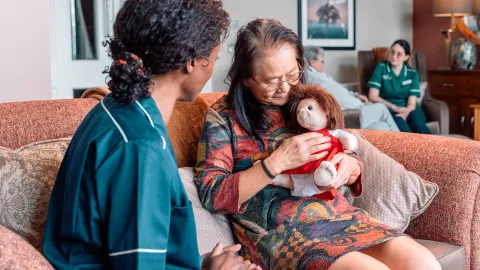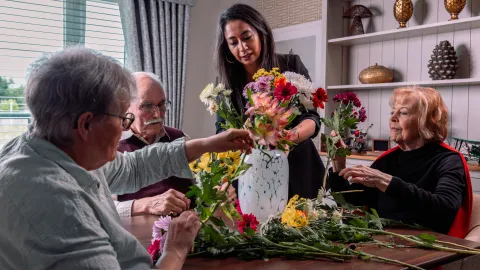
Explaining dementia to a child
Finding out that a relative or friend has been diagnosed with dementia is an extremely difficult experience. There are so many new obstacles to consider, with explaining what is happening to children or grandchildren among them. It is very important that the changes in a grandparent are explained to children. We share how to broach this sensitive subject with children and why it is important to do so.
Why dementia needs to be explained to children
We understand that for parents it is a natural instinct to want to protect your child from upsetting situations and broaching a subject so sensitive and complex can be daunting. However, there are a number of reasons why it’s important to talk about dementia with children:
- Parents know how perceptive young children are. They are often aware of tensions and changes in your mood, even if they don’t know what has caused them. Explaining dementia to a child will help put them at ease.
- Helping children in understanding dementia, rather than hiding the problem, will show that you trust them to cope with a difficult situation. Learning to deal with painful emotions will make them stronger as they grow older and are faced with other challenges.
- If a child was particularly close to their grandparent and witnesses a change in their behaviour, they may feel as if they have done something wrong. Explaining why the personality of the person living with dementia has changed allows them to try and become close to that person again, understanding that this change was not caused by them or directed at them.
Who should tell children about a dementia diagnosis?
Who should be explaining dementia to a child depends on the family dynamic and the stage of the condition. Some people living with dementia may be able to talk directly to children, which can be reassuring as it demonstrates they’re still able to have a relationship.
Even if this is the case, it’s important for another close relative to offer support and help to answer any questions. They may also want to refer back to this conversation with the child as the person living with dementia’s condition progresses.
If it’s not possible for the individual to tell the child themselves, then explaining dementia to family members may fall to another loved one. The closeness of the bond between these people will help to determine who is the right person to break the news and talk through it calmly.
When should we tell children about dementia?
Early and honest communication with children is key to ensuring they’re given the best possible opportunity to cope well with the diagnosis. Not only will being open with them help to promote trust, it can ease distress as not knowing what’s wrong when things clearly aren’t right can be confusing and lead to them jumping to conclusions.
Since dementia is a progressive disease, telling children at an early stage will help them to adapt before the worst of the side effects set in. It could also allow them to have conversions with grandparents that won’t be possible further down the line, creating memories that can be cherished.
What should you say to children about dementia?
Understanding dementia for families has two elements to it - what the condition is and why it will affect their loved one. A clear explanation of the disease is important for the child to start comprehending what is happening, as well as information about what stage their relative is at.
Being prepared in advance with the facts before starting a conversation with children about dementia will make it easier. Think about the phrases and analogies you can use to make the concepts easier for younger people to understand.
Explain how the dementia is likely to progress for their grandparent and what the changes to come might look like. Also, expect to answer your child’s questions, as there are likely to be elements of the diagnosis that they’re particularly worried about, so it’s crucial to be ready to reassure them.
How to explain dementia to children
When explaining dementia to a child, it’s evidently extremely important to be as honest as possible, allowing them to feel comfortable asking questions and speaking openly about their feelings. But how do we raise the subject with children? And explain clearly rather than adding more confusion?
At Barchester, we know how important this conversation is. This is why we have put together some useful guides to help children understand dementia. Virginia Ironside, author of several books, seven of which are for children, has written two short stories for Barchester to help explain dementia to children.
One explains a child’s first visit to see their grandad in a residential home and the second a visit to see gran. These story guides are downloadable and include questions that the young person may have about dementia.
They are clear, calm and relatable, helping adults with how to phrase talking and answering questions about this sensitive subject. And of course, these stories can be revisited, which is extremely useful in reinforcing the message if a child becomes confused in understanding dementia.
How to continue the conversation
Discussing dementia as a family should be an ongoing conversation and you should let children know they can broach the subject with you whenever they like. It often takes time for them to process the situation and further questions may arise as their grandparent’s symptoms emerge.
The Alzheimer’s Society recommends these books for explaining dementia to family members, as well as these groups and resources to help them cope.
Activities to teach about dementia
Reading books is just one of the activities to teach about dementia, with drawing pictures and watching videos also useful ways to explore the subject with children. Alzheimer’s Research UK and Dementia UK offer some resources you can use.
This Let’s Talk About Dementia video is presented by children, making it a good starting point to introduce your children to the concept. It explains what they can expect to happen and addresses some of the worries they might be feeling, as well as offering advice on how they can still spend time with people living with dementia.
Dementia care at Barchester
Barchester is an experienced provider of dementia care with dedicated ‘Memory Lane’ communities. Our objectives are always person led; we continue to see the person before we see their dementia, helping them to live life in the fullest way possible.
If you would like to hear from us about our dedicated dementia care, please don’t hesitate to get in touch. We want to support your entire family, whether it is in relation to explaining dementia or choosing a dementia care home.


